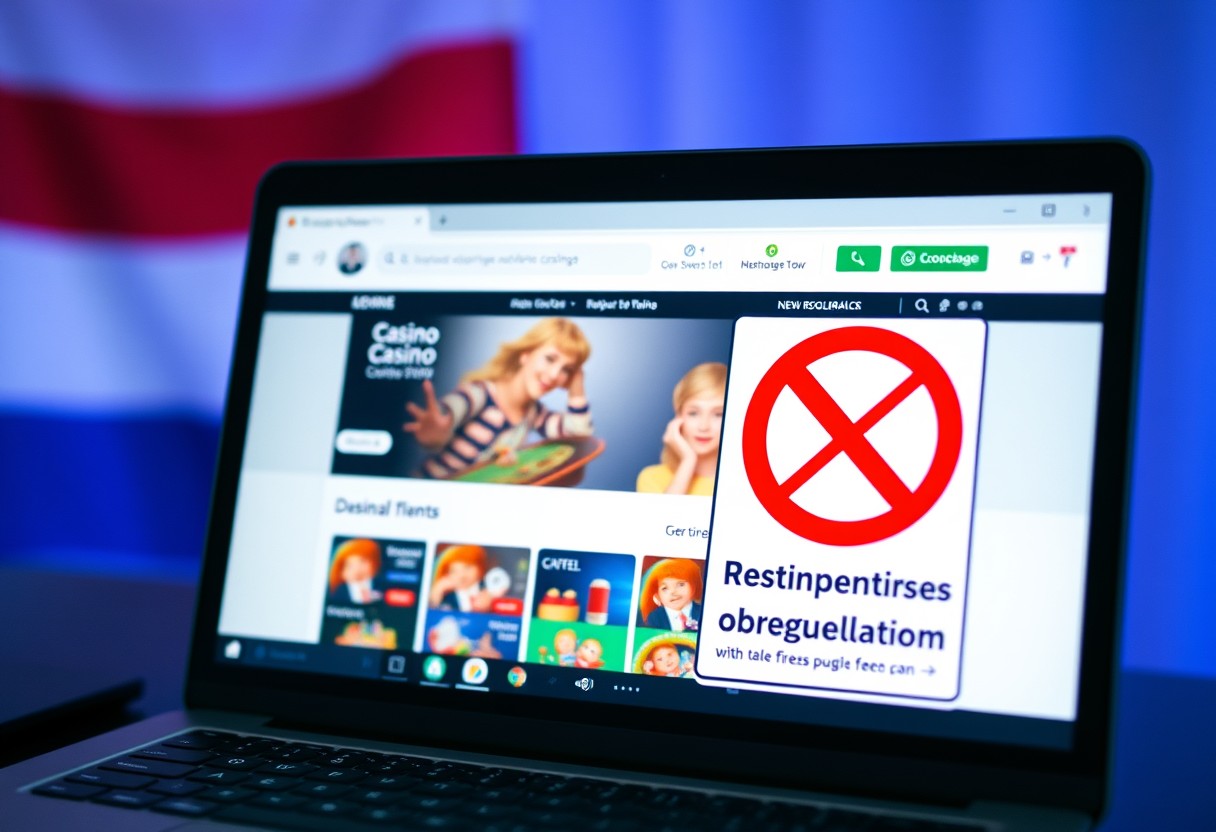Netherlands Tough Stance on Online Casinos

Most countries are still grappling with the complexities of regulating online gambling, but the Netherlands has adopted a particularly rigorous approach. Following the enforcement of the Remote Gambling Act in 2021, the Dutch government has implemented stringent regulations aimed at protecting consumers and combatting illegal gambling practices. This blog post probes into the implications of the Netherlands' tough stance on online casinos, the challenges it presents for operators, and what the future may hold for both regulators and players within this evolving landscape.
Overview of Online Gambling Regulations in the Netherlands
To understand the landscape of online gambling in the Netherlands, it is crucial to recognize the regulations set forth by the Kansspelautoriteit (KSA), the national gambling authority. The Remote Gambling Act, enacted in April 2021, established a legal framework for online casinos, allowing licensed operators to offer services to Dutch players while prioritizing player protection, responsible gambling, and the prevention of fraud and addiction. This cautious approach signifies the Netherlands' commitment to regulating this rapidly evolving industry effectively.
Historical Context
Online gambling in the Netherlands has faced a tumultuous history, navigating various debates and legislative hurdles. Initially, the gaming landscape was dominated by state-run facilities, with online gambling considered illegal until the introduction of the Remote Gambling Act in 2021. This transition marked a significant shift from a prohibitionist stance to a regulated framework aimed at safeguarding consumers and enhancing tax revenues.
Recent Legislative Changes
On July 1, 2021, the Dutch Remote Gambling Act came into effect, allowing licensed online gaming operators to offer their services legally. This act emphasizes the importance of player protection, mandates responsible gambling measures, and imposes strict penalties on unlicensed operators. The KSA has been vigilant in enforcing these new regulations, promoting a safer online gambling environment while rising to curb the illegal gambling market.
This legislative shift has transformed the Dutch online gambling market, increasing competition among licensed operators and providing consumers with safer, regulated options. The KSA has implemented stringent application processes for potential licensees and has prioritized collaboration with other European gambling authorities to ensure effective enforcement. As a result, the Netherlands is positioning itself as a leader in responsible online gambling regulation, aiming to adapt and respond to emerging trends in the industry.
The Dutch Gambling Authority: Role and Responsibility
Even as the online gambling landscape evolves, the Dutch Gambling Authority plays a crucial role in regulating the sector. Tasked with ensuring fair play, protecting consumers, and preventing gambling addiction, this regulatory body oversees the licensing and compliance of online operators. By enforcing strict guidelines, the authority aims to create a safe gambling environment while maintaining the integrity of the industry in the Netherlands.
Enforcement Mechanisms
One of the key strategies employed by the Dutch Gambling Authority is its enforcement mechanisms, which include regular audits, monitoring of online platforms, and the imposition of fines on non-compliant operators. By actively engaging in surveillance and compliance checks, the authority ensures that all licensed online casinos adhere to established regulations, fostering a responsible gambling ecosystem.
Licensing Requirements
Enforcement of robust licensing requirements is fundamental to the Dutch Gambling Authority's strategy. These requirements include stringent financial prerequisites, transparency standards, and provisions for player protection, designed to ensure that only reputable operators enter the Dutch market.
Mechanisms to secure a license include thorough background checks on operators, financial stability assessments, and evaluations of responsible gaming practices. Additionally, the licensing process mandates that operators implement measures to prevent gambling addiction and promote safe gambling environments. Consequently, this multi-faceted approach aims to protect players while ensuring that licensed online casinos contribute positively to the market. By maintaining high standards, the Dutch Gambling Authority upholds the integrity of the gambling sector in the Netherlands.
Consumer Protection Measures
Any shift toward regulated online gambling in the Netherlands has led to the implementation of various consumer protection measures. These initiatives are aimed at ensuring that players can engage safely with online casinos while also minimizing the risks associated with gambling. The government's commitment to consumer protection reinforces the integrity of the gambling environment and promotes responsible play among users.
Player Safety Initiatives
For players engaging in online gambling, safety initiatives are critical in maintaining trust and security. The Dutch Gaming Authority has introduced several regulations that enhance player identification and authentication processes, thereby preventing fraud and ensuring that players are protected against unauthorized access to their accounts.
Responsible Gambling Measures
One key component of consumer protection in the Netherlands is the emphasis on responsible gambling measures. These measures aim to foster a safer gaming environment by equipping players with tools and resources to manage their gambling activities effectively.
The overall strategy includes self-exclusion options, where players can voluntarily ban themselves from gaming for a certain period, as well as deposit limits to control their spending. Additionally, operators are required to provide information on gambling risks and promote awareness of available support services. These initiatives not only protect players but also contribute to the overall public health perspective by addressing the potential harms associated with gambling activities.
Impact on Operators
Now that the Netherlands has implemented strict regulations on online casinos, operators are facing a paradigm shift in their business strategies. Compliance with newer laws means they must invest more resources in legal expertise, technology, and responsible gaming measures. Additionally, they need to navigate a more competitive market landscape while maintaining their brand’s integrity.
Challenges Faced by Online Casinos
On entering the regulated market, online casinos are confronted with numerous challenges, including higher licensing fees, stringent marketing restrictions, and the need for advanced player verification processes. These hurdles can strain operational capacities, particularly for smaller operators who may struggle to meet the new compliance standards.
Opportunities in the Regulated Market
Market regulation, while presenting challenges, also opens up significant opportunities for online casinos. Adherence to legal standards can enhance a brand's credibility and attract a broader customer base looking for safe and trustworthy gaming experiences.
With a regulated market, operators can capitalize on consumer trust and focus on creating innovative and engaging gaming experiences. This environment encourages responsible gambling practices while allowing operators to market their offerings to a wider audience. Furthermore, the legal framework can facilitate partnerships with local businesses and enhance loyalty programs, providing a competitive edge. By navigating this challenging landscape effectively, online casinos can solidify their position and drive long-term growth in the Netherlands.
Comparative Analysis: Netherlands vs Other European Countries
Unlike several European nations that have adopted more relaxed regulations regarding online casinos, the Netherlands maintains a stringent stance on gambling. This context sets the stage for a closer examination of various countries and their approaches to online gaming. Below is a comparative overview:
| Country | Gambling Regulation Approach |
|---|---|
| Netherlands | Strict licensing and enforcement |
| UK | Regulated with a focus on responsible gambling |
| Sweden | Open licensing system with high taxes |
| Germany | Mixed regulations, evolving towards more openness |
Similarities and Differences
For many European countries, online gambling regulation has become a complex balancing act of promoting economic benefits while ensuring player safety. While the UK and Sweden encourage online gaming through comprehensive licensing, the Netherlands remains cautious, adopting a stricter approach to protect its citizens from potential harms.
Lessons Learned
European regulators can draw important lessons from the Netherlands’ approach to online casinos. Their focus on strict licensing ensures operational accountability and consumer protection. This serves as a cautionary tale for other nations that may be tempted to adopt looser regulations without fully understanding the implications.
Plus, the experience in the Netherlands emphasizes the need for a tailored strategy that not only considers revenue generation but also prioritizes player welfare. This could lead to improved measures that mitigate gambling addiction, keeping societal impacts at the forefront while navigating the complexities of an evolving online gaming landscape.
Future Outlook for Online Gambling in the Netherlands
All eyes are on the Netherlands as it navigates the complexities of regulating online gambling. As the market matures, stakeholders anticipate a shake-up in regulation aimed at fostering responsible gambling while maximizing tax revenues. The government is poised to balance consumer protection and industry growth, positioning itself to set a precedent for other jurisdictions grappling with similar issues.
Potential Policy Changes
Outlook for potential policy changes suggests that the Dutch government may refine the existing regulatory framework to address emerging concerns. More stringent laws surrounding advertising practices and player protection mechanisms could be introduced to combat gambling addiction and ensure responsible gaming. Stakeholders should remain vigilant as these discussions evolve.
Market Predictions
Market predictions indicate substantial growth for the online gambling sector in the Netherlands, with expectations of increased participation and revenue. Analysts foresee rising competition among licensed operators, leading to innovative offerings and enhanced customer experiences.
Another significant trend is the heightened interest in niche markets, such as skill-based games and esports betting. As regulations adapt, operators may diversify their portfolios to attract younger demographics, thereby further transforming the landscape of online gambling in the Netherlands. This evolution will likely encourage ongoing dialogue concerning regulations and ethical practices, shaping the future of the industry.
Conclusion
Conclusively, the Netherlands' stringent regulations on online casinos reflect a robust approach to gambling control, emphasizing player protection and responsible gaming. As the legal landscape continues to evolve, stakeholders must navigate the complexities of compliance while addressing consumer demands. Moving forward, the balance between regulation and market growth will be crucial in shaping the future of the online gambling sector in the Netherlands, as the government looks to ensure safe and fair play for its citizens alongside a thriving industry.
FAQs
What is the Remote Gambling Act?
The Remote Gambling Act, enacted in April 2021, is a Dutch law that regulates online gambling. It allows licensed operators to offer services to Dutch players while focusing on player protection, responsible gambling, and combating illegal gambling practices.
How does the Dutch Gambling Authority ensure compliance?
The Dutch Gambling Authority ensures compliance through regular audits, monitoring online platforms, and imposing fines on non-compliant operators. It also requires operators to meet strict licensing requirements to ensure fair play and consumer protection.
What are the key challenges for online casinos in the Netherlands?
Online casinos in the Netherlands face challenges such as higher licensing fees, stringent marketing restrictions, and the need for advanced player verification processes. These requirements can be particularly burdensome for smaller operators.
How do the Netherlands' gambling regulations compare to other European countries?
Unlike countries like the UK and Sweden with more relaxed approaches, the Netherlands has adopted strict regulations with a focus on consumer protection. This cautious stance contrasts with the more open or evolving regulations seen in other European nations.
What are the future prospects for online gambling in the Netherlands?
The future prospects include potential policy changes aimed at enhancing player protection and maximizing tax revenues. Increased competition among licensed operators is expected, leading to innovative offerings and potentially more focus on niche markets like skill-based games and esports betting.
Michael
With over 20 years experience in web design, SEO and website promotion I always give you an expert advice in regard to any issues related to your Site Design, SEO, Internet Marketing, Promotion, Backlinks, Site Content. In order to help you find out what is missing or can be improved and get higher rankings in Google and more traffic.
Recommended Posts

Gamanza Games Expands into the Dutch Market
October 5, 2024

Evolution’s Live Casino Studio Opens in Prague
October 5, 2024

Discover Mighty Symbols: Jokers by Wazdan
October 5, 2024




